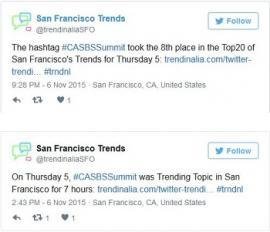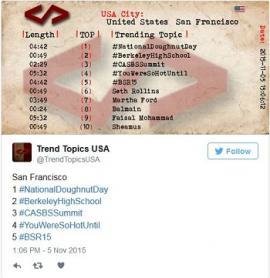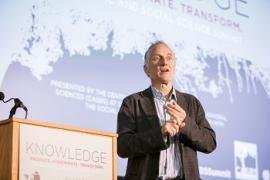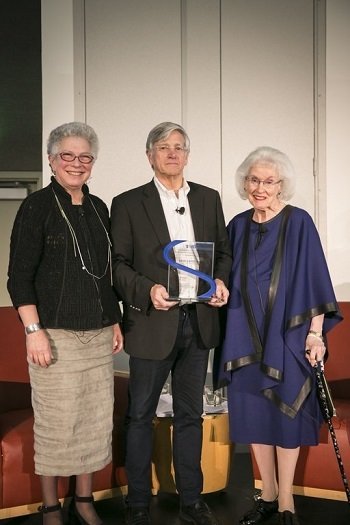
The 2015 Behavioral and Social Science Summit, hosted by CASBS in collaboration with the Social Science Research Council (SSRC), explored issues associated with how and where knowledge is produced, analyzed, and disseminated – and the way we should think about and react to the resulting transformative changes occurring around us.
Held on the Stanford University campus on November 5, the summit brought together some of the brightest minds and innovators from universities, government, and industry, along with nearly 200 attendees for a full day of discussions on governing with digital data, exploring tools for promoting “new literacies” and informing better policy, to name just a few of the subjects.
Watch the 11-video playlist on the CASBS YouTube channel.

The CASBS summit builds on the Future of Scholarly Knowledge project, a four-year effort spearheaded by Columbia professor Kenneth Prewitt. Read about the project here.
Keynote addresses delivered by Tim O’Reilly and Ken Prewitt, respectively, set the context for anchoring the day’s discussions. Panels focused on related issues and questions complemented the keynotes.Interest in the summit, according to one modern measure, was huge. The summit’s social media hashtag -- #CASBSSummit – was a trending topic on Twitter for most of the business day in the San Francisco area, according to @TrendTopicsUSA, @trendinaliaSFO, and @CaliforniaTrenz. For a two-and-a-half hour period #CASBSSummit peaked as the third most popular topic in the Bay Area; overall for the day it trended eighth.
Work and the Next Big Wave
Famously dubbed “The Oracle of Silicon Valley,” O’Reilly Media founder and CEO Tim O’Reilly has a track record of framing conversations that shape or reshape the tech industry. He recently has focused on technologies transforming/disrupting the nature of work, a subject that resonates with the CASBS Future of Work and Workers Project.

He described a network-mediated “collective consciousness” in which our knowledge of the world is getting richer – more and more sensors are being incorporated into our devices, services and processes, for example – and driving toward a “global brain” that is us, “connected and augmented.” These are systems comprised of humans and computers working together. With services like Uber and Lyft and AirBnB people are “literally part of the app.” This can be a way of conferring power not just to consumers, but workers as well. This notion of augmenting people, according to O’Reilly, “so that they can do things that they couldn’t do before, actually becomes game-changing.”
This requires a reconceptualization of work, workers, and artificial intelligence, for “the question of how we organize ourselves in this new world is going to be fairly critical.”
Though O’Reilly concedes there’s a lot of pain and displacement awaiting some workers and much to work-out in this emerging “experience economy,” he challenged Silicon Valley to think bigger.
His recommendation: We have to stop thinking about jobs and start thinking about work. But will we start to run out of work in the next economy? To this O’Reilly quotes entrepreneur, venture capitalist, and civic activist Nick Hanauer: “Technology is the solution to human problems. We won’t run out of work till we run out of problems.”
“We have to take all this marvelous technology and put it to work on the right stuff,” said O’Reilly. “We should be saying ‘What needs doing that’s hard that we couldn’t do before that we can do now…and bring out all of our best ingenuity and best thinking to solve those problems.’
“And then I guarantee you, there will be plenty of work to go around.”
View O’Reilly’s accompanying slide presentation here.
Birth Pangs of a New (Social) Science
Kenneth Prewitt is Carnegie Professor of Public Affairs at Columbia University and winner of the 2015 SAGE-CASBS Award for outstanding achievement in advancing understanding in the social and behavioral sciences. His keynote explored the shifting balance and consistency between scholarly independence and the ability of (social) science to exert impact in the context of a data-rich landscape.
Prewitt contrasted the early days after World War II, when the scientific community enjoyed heavy autonomy and light accountability, with the current “infatuation” with performance metrics being demanded of that community. He identified a gap between the community’s claims about the amount of knowledge it produces and the amount of that knowledge that actually is used. We do not have a systematic understanding of why the gap exists or its magnitude – something that must be examined – and thus “we’re feeding the perception that our stuff isn’t as important as we say it is.” This is compounded by scientific self-policing that, in recent years, has proven to be not as robust as once thought. We’re left with “a very messy situation,” or “funny moment” that requires “a complicated conversation about how we’re going to be held accountable…”
What’s needed, according to Prewitt, is nothing short of a new U.S. science policy for the 21st century where the “autonomy regime” balances the strong interest (outside the scientific community) in an “accountability regime.”

But where to start? Prewitt (seen here with CASBS director Margaret Levi, left, and Sara Miller McCune) outlined what for him are essential principles.
First, it is “seriously wrong-headed” to deny science an autonomous sphere. It needs space to fail and “serendipitously stumble around.” Why? Prewitt wants to bury the basic science versus applied science dichotomy. Rather, they are the same science at different phases – knowledge that is used and knowledge that is waiting to be used. Prewitt asserts that many of science’s social and public benefits become appreciated only retroactively. Accordingly, “by definition [science] has no space for performance metrics…you can only measure its performance after-the-fact.” The scientific community is “capable of producing knowledge so fundamental that it will be used.” In other words,
Only scientists can judge what constitutes good science. … If you’re outside the scientific community and you try to do that, you will mess it up; you will not do a good job…because we have to be in a position to judge the quality of our own work.”
Second, if the scientific community can avoid metrics in the autonomy regime, it “cannot and even should not try to get away with it with the accountability regime”:
…only those in the spheres of government, commercial sector, and civil society have the experience and expertise to judge how and when the evidence can be used to build a better commercial product, to create a different policy, to create a social practice. It is the people who are actually using it who are going to make the decision about its use.
The scientific community can advise these processes, of course, but its core competency does not lie in the realm of policy, practice, or product.
The bottom line: For at least a half-century the accountability-autonomy conversation has been zero-sum, in Prewitt’s estimation. That must be transformed into a positive-sum game in which the scientific community negotiates a new relationship with political leadership and more generally with society.
Forward
In his closing remarks, SSRC president Ira Katznelson could not help but notice that the issues the summit unpacked are “so fundamental and so vexing,” raising more questions than answers. He took note of the tensions inherent in the production, dissemination, use, and transformation of knowledge “under contemporary conditions of uncommonly high uncertainty.” We must manage those tensions to stimulate creativity “as opposed to lapsing into stasis and sometimes even fear of where we are and where we’re going.”
CASBS director Margaret Levi sounded a note of concurrence:
New forms of knowledge production and dissemination transform our institutions, our societies, ourselves. This summit offered an opportunity to think hard about the present and future of knowledge and to begin our preparations for what lies ahead.
The preparations will advance yet further in the spring. SSRC will host a series of follow-up workshops on the topic of knowledge, the first occurring in New York City on May 9.
“May the conversation thrive,” said Katznelson.
* * *
The 2015 Behavioral and Social Science Summit was sponsored by SAGE Publications, The William and Flora Hewlett Foundation, the Henry Luce Foundation, and the Dean of Research at Stanford University. Pacific Standard served as media partner.
List of sessions
- Informing Better Policy. Joshua Cohen, Jennifer Eberhardt (former CASBS fellow, Jacquelline Fuller
- Governing with Digital Data. John Markoff (former CASBS visiting scholar), Beth Noveck, Brian Pierce
- Is the Medium the Message? Henry Farrell, Craig Forman, Annalee Saxenian
- The New Literacies. Morgan Ames, Jennifer Pahlka, Maryanne Wolf (former CASBS fellow)
- The Relevance of Research Universities. Renu Khator, Sara Miller McCune (CASBS board member)
- The Future of Agency: Small Problems. John DeGioia, Peter Ho, John Seely Brown (CASBS board member), Ann Pendleton-Jullian
- The Future of Agency: New Tools. Christopher McNaboe, Terry Young, John Seely Brown, Ann Pendleton-Jullian
